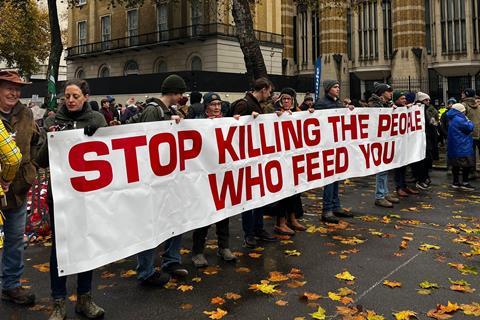
What a remarkable day in Westminster. A day of anger at the government’s changes to inheritance tax. Also, a day of passion, unity and hope. Tens of thousands of farmers speaking as one.
On Tuesday – one of the coldest, wettest days of the year – well over 10,000 farmers from all parts of the UK braved rain and snow at a rally in Whitehall. Generations of farming families – from young toddlers to octogenarians – showed off the very best of British agriculture and their deeply held values of trust and respect, which run through the veins of our rural communities.
There was also the NFU’s mass lobby for 1,800 of our members. They went off to meet their MPs, with over 200 meetings organised, to look them in the eyes and ask if they support this family farm tax, or if they will do the right thing for their farming constituents and support our call for the move to be reversed.
Our industry feels completely betrayed. A year ago, the then Defra shadow secretary of state, Steve Reed, said no changes would be made to Agriculture Property Relief if Labour won the general election. Suddenly, out of the blue, they’ve gone ahead and changed it.
A whole generation of farmers, the working people of the countryside who make little profit, are now faced with the potential prospect of burdening their loved ones with selling off part of their farm to pay a huge inheritance tax bill. In all likelihood, it will make that same farming business unviable in the process.
We know a 0.5% return on assets is just above the average for medium-sized farms over the past five years. These aren’t cash-rich people. Many struggle to make a living, let alone invest into the business to deliver long-term food security for the UK. Now, farmers will need to start paying into pensions and life insurance, rather than investing in the very infrastructure that delivers the food security this country desperately needs.
The budget’s announcement on changes to Inheritance Tax is just the latest body-blow for an industry on its knees. The recent Farm Business Income figures confirmed the stark picture facing many farmers. Rising input costs, significantly lower commodity prices, a reduction in direct payments, and one of the wettest winters in decades have left many businesses worse off.
While most attention has been on changes to Agriculture Property Relief and Business Property Relief, Rachel Reeves’ budget also threw in other curveballs. Such as an acceleration to the end of the direct payment phaseout, which means no farm will receive more than £8,000 in 2025 as part of the agriculture transition. Or the increase of 6.7% in the national living wage to £12.21. Plus, a hike in employers’ National Insurance contributions, which must be passed up the supply chain.
Read more:
-
‘We’ll have nothing left’: Emotional reactions from Westminster farmers’ protest
-
Farmer protests kick off in London following ‘stab in the back’ budget
-
Labour’s disregard for farmers makes my blood run cold
All of these announcements could have a significant impact on our ability to produce food for the nation – just two years on from the stark images of empty supermarket shelves for some household staples.
We know CEOs from our biggest retailers are so worried they have written to the Chancellor to share their significant concerns about the impact of the budget on the retail industry, and the economic consequences for inflation, employment and investment.
The very real fear is that we start to see farms being sold off and broken up, unlikely to be bought by other farms, and instead used for housing, solar and wind schemes. Agricultural land has never been more sought after as it is now.
Inevitably, it’s the end customer that loses out. The British public, who demand high-quality food produced to the highest standards. Consumers who we know back British farming: more than a quarter of a million people have signed the NFU petition against these tax changes.
The anger and frustration remain palpable. I’ve never known anything like it. If government thinks this is going away, they are very wrong. The farming industry is united in overturning this disastrous policy, with hundreds of thousands of members of the public behind us. Only by sitting down at the table with industry can government work a way out of this terrible mess.







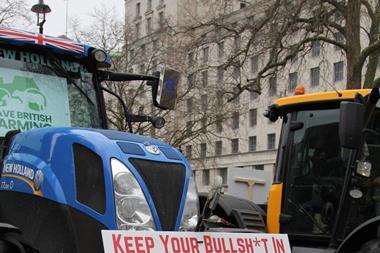
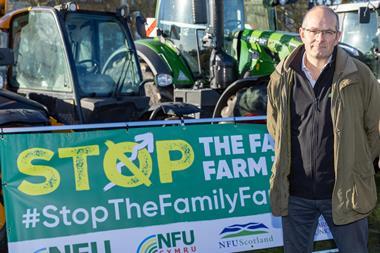
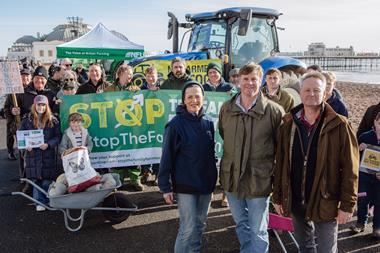

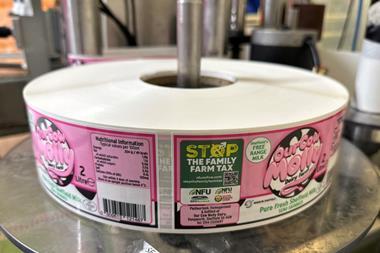
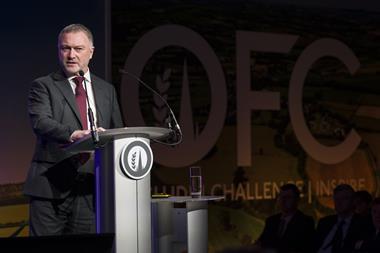






No comments yet